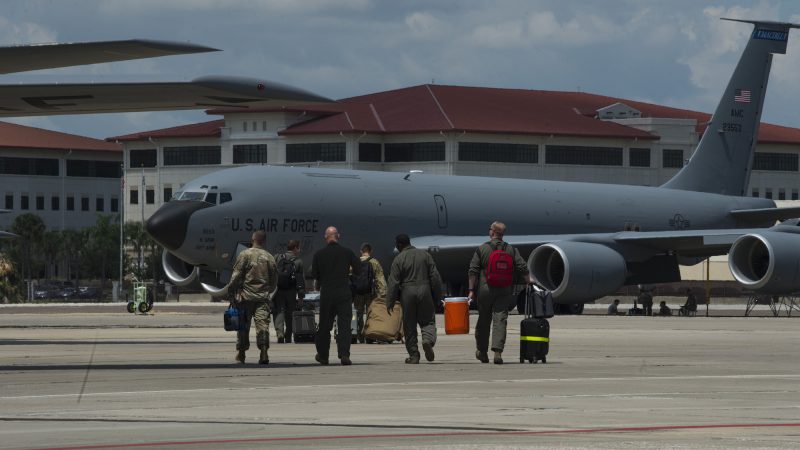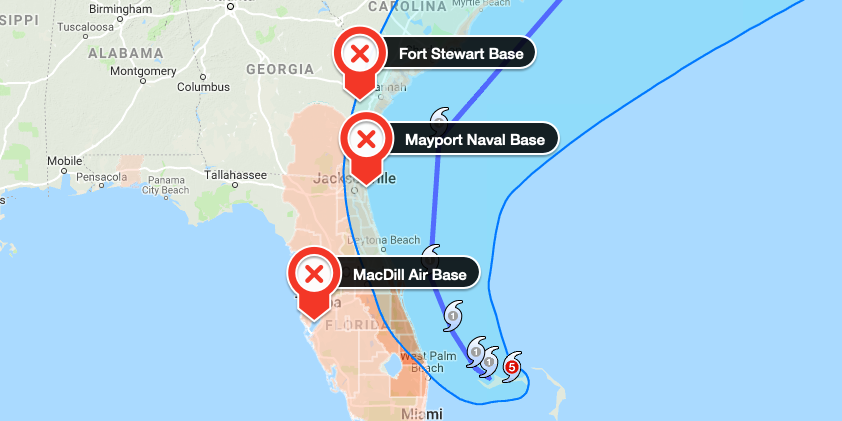- Hurricane Dorian is approaching the US, with devastating power and an unpredictable path.
- The US military has taken precautions to defend its assets, by readying base personnel and moving planes and ships out of the way.
- The task is especially difficult given how wide an area the storm could potentially hit.
- It came as more than 1 million US civilians were ordered to evacuate their homes.
- Visit Insider’s home page for more stories.
Hurricane Dorian continued to flummox weather forecasters and military officials Monday as they struggled to predict where the dangerous and unpredictable storm might hit the mainland.
The storm, which was recorded over the weekend blasting out winds in excess of 200mph, has provided unusually difficult to predict, defying many common models used by forecasters.
This has forced military planners to either shut down or take action to protect bases ranging from Florida to southern Virginia.

Over the weekend, the US Navy sent six guided missile frigates and destroyers out to sea from Naval Station Mayport in Florida, in the hope they can safely ride out the storm from a considerable distance.
At the large MacDill Air Force Base, just outside Tampa, Florida, measures were underway to protect a wide range of observation planes, search-and-rescue planes, helicopters, and fighter jets from estimated 60 mph winds and heavy rain.
The smaller combat aircraft tend to have hardened hangers for protection. But for larger aircraft it is not so easy: the base dispatched its fleet of KC-135 Stratotanker aerial refueling tankers to McConnell Air Force Base in Kansas on August 30.
Read more: Hurricane Dorian claimed its first victim, an 8-year-old boy who reportedly drowned in the Bahamas
A military contractor at MacDill told Insider that preparations there were the biggest since the run-up to the devastating Hurricane Andrew in 1992.

As of early Monday, the storm's path appears to leave MacDill safe from heavy damage. In a video posted Sunday, base officials told employees that Tuesday was likely to be a normal work day.
MacDill is home to the US military regional Central Command, which is the administrative headquarters for US military operations in the Middle East and Central Asia.
The very unpredictable nature of Dorian's movements has made planning tough on military officials.
What was expected to be a Category 4 storm hitting southern Florida spent the weekend turning into a Category 5 storm. It is now expected to move up the east coast towards the Carolinas and southern Virginia.
This new path puts it in the track of military bases that are only beginning to evacuate planes and bolster defenses against high winds and storm surge.
The storm's new direction led jets and transport planes at Fort Stewart, Georgia, to be flown further up the east coast.
Dorian update. Fort Stewart-Hunter Army Airfield remains in the error cone. We could see impacts mid to late next week and residents are still encouraged to prepare for any potential impacts to our area. Use https://t.co/AVM9xVzyIv for a real-time snapshot of road conditions. pic.twitter.com/AOHJ2rFXYq
— Fort Stewart-Hunter Army Airfield (@USAGStewartHAAF) September 1, 2019
Fort Stewart has a small airfield and is the home of the 1st Battalion of the 75th Ranger Regiment, an elite light infantry unit whose members deploy year-round in Afghanistan and Iraq in support of special operations troops.
While the storm is unlikely to disrupt these operations, the families of deployed soldiers have been warned to protect housing, fill essential prescriptions and store food and water.
The US military does not release the number of people living at Fort Stewart who are dependents of deployed soldiers. But one former member of the Ranger regiment - who asked for anonymity when discussing foreign deployments - put the number in the "low hundreds if not higher."
As the military evacuates or battens down its facilities across the threatened region, it will have far less air traffic to deal with as commercial airlines and airports continue to shut down or reroute operations due to the storm.
As of early Monday morning, an estimated 1,000 flights had been canceled in the United States, almost all of them directly related to Dorian, according to the website FlightAware.
